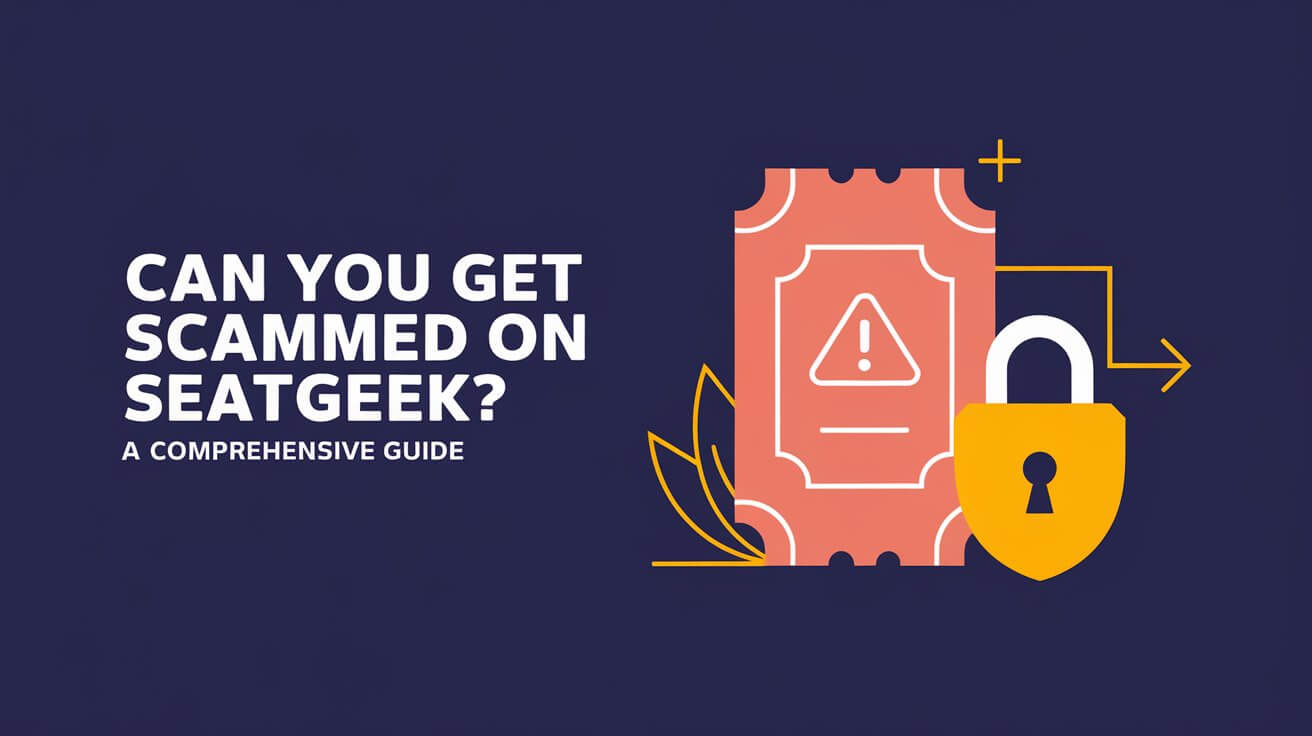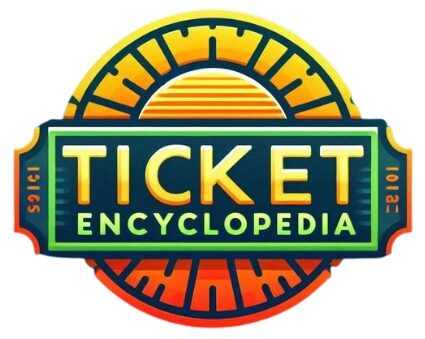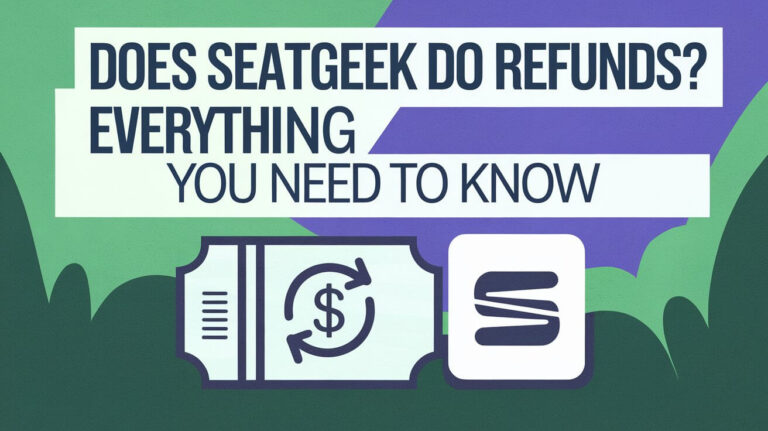Can You Get Scammed on SeatGeek? A Comprehensive Guide

Online ticket marketplaces like SeatGeek have revolutionized how we buy and sell event tickets. However, with these conveniences come risks, including the potential for scams. In this detailed guide, we’ll explore whether you can get scammed on SeatGeek, how to recognize various scams, and how to protect yourself.
SeatGeek and Its Operations
What is SeatGeek?
SeatGeek is a digital ticketing platform that aggregates tickets from various sellers into one easy-to-navigate marketplace. It allows users to buy and sell tickets for sports, concerts, theater, and other live events. The company provides a user-friendly interface with features like interactive seat maps, price alerts, and Deal Score™ to help buyers find the best deals.
How SeatGeek Works
SeatGeek operates on a secondary ticket marketplace model, connecting buyers with sellers. Sellers can list tickets for events, and buyers can purchase them directly through the platform. SeatGeek also integrates with primary ticket sellers, enabling a comprehensive selection of tickets.
The SeatGeek Guarantee
SeatGeek offers a guarantee to ensure a positive experience for its users. This includes:
- Ticket Authenticity: Guaranteed tickets will be valid for entry.
- Timely Delivery: Tickets will be delivered in time for the event.
- Refunds: If the event is canceled and not rescheduled, buyers receive a refund.
These measures aim to protect users from fraud and ensure a trustworthy transaction.
Types of Scams on SeatGeek
Fake or Invalid Tickets
How it Happens: Scammers create counterfeit tickets that look real but aren’t valid for entry. This can happen with both digital and printed tickets.
Example: A user buys a ticket for a major concert, but upon arrival, they discover the ticket is invalid and are denied entry.
How to Avoid: Verify the ticket’s legitimacy through the SeatGeek app or check with the venue.
Seller Scams
How it Happens: Sellers might list tickets with misleading information or fail to deliver after receiving payment.
Example: A buyer purchases front-row seats but receives tickets for a different section upon delivery. Sometimes, sellers may disappear after the transaction.
How to Avoid: Buy only from sellers with good ratings and reviews. Use SeatGeek’s secure payment options.
Phishing Scams
How it Happens: Scammers send emails or create fake websites that mimic SeatGeek to steal personal information or payment details.
Example: A user receives an email that looks like it’s from SeatGeek, prompting them to click a link and enter their login credentials.
How to Avoid: Always verify the URL and avoid clicking links from unsolicited emails.
Overpriced Tickets
How it Happens: Third-party sellers inflate ticket prices far above the market value, exploiting high demand.
Example: Tickets for a popular event are listed at double or triple the face value.
How to Avoid: Compare prices on multiple platforms and use SeatGeek’s Deal Score™ to gauge the ticket’s value.
Common Red Flags to Watch Out For
Unrealistic Prices
Indicator: Tickets priced significantly lower than the average.
Why It’s a Red Flag: Extremely low prices may indicate counterfeit tickets or a scam attempt.
How to Handle: Use SeatGeek’s price comparison tools and research average ticket prices for the event.
Suspicious Seller Information
Indicator: Sellers with no reviews, recent accounts, or incomplete profiles.
Why It’s a Red Flag: New or poorly reviewed sellers might be unreliable or fraudulent.
How to Handle: Only buy from established sellers with positive feedback.
Last-Minute Sales
Indicator: Tickets being sold very close to the event date.
Why It’s a Red Flag: Last-minute sales can be risky, especially if the tickets haven’t been properly verified.
How to Handle: Ensure the seller has a good track record and verify tickets before purchase.
How to Protect Yourself from Scams on SeatGeek
Verifying Ticket Authenticity
Step 1: Use the SeatGeek app to scan and verify digital tickets.
Step 2: Contact the venue directly to confirm the ticket’s validity if you’re unsure.
Step 3: Avoid buying physical tickets unless you can meet the seller and verify their identity.
Checking Seller Ratings and Reviews
Step 1: Read seller reviews and check their rating on SeatGeek.
Step 2: Look for patterns in the reviews that might indicate consistent issues.
Step 3: Consider the seller’s history and avoid those with recent complaints.
Secure Payment Methods
Step 1: Use SeatGeek’s integrated payment system for secure transactions.
Step 2: Avoid paying with wire transfers or other non-secure methods.
Step 3: Credit cards often offer fraud protection, making them a safer option.
Using the SeatGeek Guarantee Effectively
Step 1: If you suspect a scam, contact SeatGeek support immediately.
Step 2: Provide all relevant transaction details to facilitate the investigation.
Step 3: Follow up to ensure you receive a refund or ticket replacement if applicable.
Real-Life Experiences and Case Studies
Case Study 1: Fake Tickets at a Concert
Situation: A user bought tickets to a popular concert but found them to be fake upon arrival.
Resolution: They contacted SeatGeek, provided evidence, and received a full refund under the SeatGeek Guarantee.
Lesson: Always verify tickets through the app or venue.
Case Study 2: Seller Disappearance Post-Purchase
Situation: A buyer purchased tickets, but the seller disappeared and never delivered.
Resolution: The buyer contacted SeatGeek support and was reimbursed.
Lesson: Always buy from reputable sellers with positive reviews.
Case Study 3: Phishing Attack Via SeatGeek Look-Alike Site
Situation: A user fell for a phishing email that directed them to a fake SeatGeek site, leading to stolen credentials.
Resolution: They quickly changed their passwords and notified SeatGeek and their bank.
Lesson: Always verify the URL and avoid links in unsolicited emails.
What SeatGeek is Doing to Combat Scams
Advanced Fraud Detection Systems
Overview: SeatGeek uses sophisticated algorithms and machine learning to detect fraudulent activities.
Features:
- Analyzes transaction patterns
- Flags suspicious behavior for review
- Provides real-time alerts for potential scams
Seller Verification Processes
Overview: SeatGeek has stringent processes to verify sellers, including identity checks and transaction history reviews.
Features:
- Requires sellers to provide valid identification
- Monitors seller behavior for inconsistencies
- Imposes penalties on sellers who violate policies
User Education and Awareness
Overview: SeatGeek offers resources to educate users about potential scams and how to avoid them.
Features:
- Blog posts and guides on safe ticket purchasing
- In-app notifications about scam warnings
- Customer support for scam-related queries
Comparing SeatGeek with Other Ticketing Platforms
SeatGeek vs. Ticketmaster
SeatGeek:
- User-friendly interface
- Aggregates tickets from multiple sellers
- Advanced Deal Score™ feature
Ticketmaster:
- Direct seller, often primary market
- Verified tickets only
- Typically higher fees
SeatGeek vs. StubHub
SeatGeek:
- Aggregates from various sources
- Often better deals due to competition
- Modern, user-friendly app
StubHub:
- Strong buyer guarantees
- Established secondary market
- Higher visibility for major events
SeatGeek vs. Vivid Seats
SeatGeek:
- Integration with primary sellers
- More transparency with Deal Score™
- Easy-to-use mobile app
Vivid Seats:
- Robust customer service
- Direct access to a broad inventory
- Often slightly higher prices
FAQs About Getting Scammed on SeatGeek
Can SeatGeek Tickets be Verified Before Purchase?
Yes, SeatGeek provides tools within their app to verify the authenticity of tickets. Additionally, you can contact the venue to confirm ticket details.
What Should I Do if I’ve Been Scammed on SeatGeek?
Immediately contact SeatGeek support and provide all relevant transaction information. If applicable, also notify your bank or credit card company to prevent further losses.
Are All SeatGeek Sellers Reliable?
Not all sellers on SeatGeek are equally reliable. It’s crucial to research sellers, read reviews, and choose those with a positive track record to minimize risk.
Summary and Final Tips
Key Takeaways for Avoiding Scams on SeatGeek
- Verify Tickets: Always check the authenticity of tickets before purchase.
- Research Sellers: Only buy from sellers with good ratings and reviews.
- Use Secure Payments: Stick to secure payment methods to protect your transaction.
Final Thoughts on Using SeatGeek Safely
While scams on SeatGeek can happen, following these guidelines will significantly reduce your risk. Stay informed, use the platform’s tools effectively, and always err on the side of caution.






